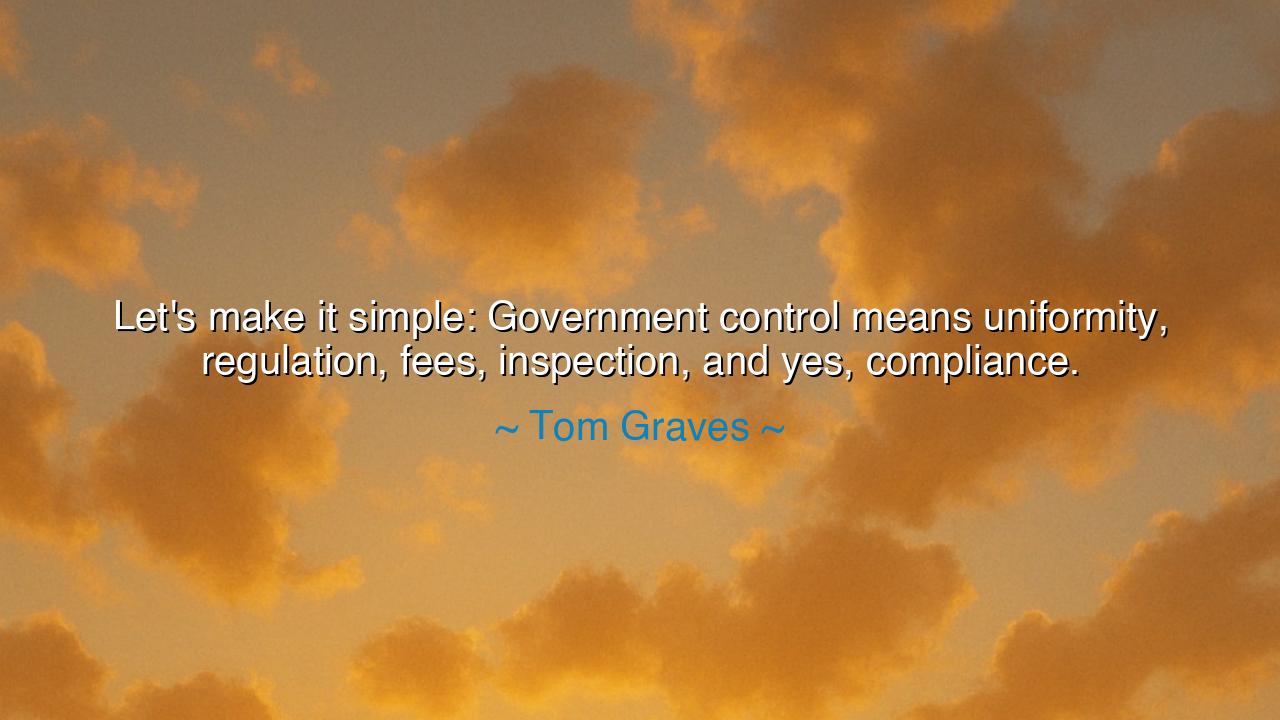
Let's make it simple: Government control means uniformity
Let's make it simple: Government control means uniformity, regulation, fees, inspection, and yes, compliance.






When Tom Graves said, “Let’s make it simple: Government control means uniformity, regulation, fees, inspection, and yes, compliance,” he was not merely listing the features of bureaucracy — he was warning of its creeping spirit. His words cut through the fog of political rhetoric to reveal a fundamental truth about power and freedom: that every act of control, however well-intentioned, carries a cost. Graves, an American congressman known for his advocacy of limited government, understood that the machinery of the state, once set in motion, tends to expand — and that in its expansion lies the quiet erosion of human initiative. His tone, though direct, echoes with the wisdom of centuries: when authority multiplies its rules, liberty begins to shrink.
The origin of this thought lies in the long tradition of those who have wrestled with the paradox of governance — that man needs law to be free, but too much law makes him a slave. In Graves’ time, as in every age, there were growing calls for government oversight in business, education, and daily life. To some, these measures promised fairness and safety; to others, they represented the slow smothering of enterprise and independence. Graves’ statement is a reflection of the American spirit born from the Revolution — the conviction that government should serve as a guardian, not a master; a guide, not a chain. His words seek to remind citizens that control and freedom are eternally at odds, and that the line between order and oppression is drawn not by intentions, but by limits.
To understand the heart of Graves’ warning, one must grasp what he means by uniformity. In the natural world, no two leaves, no two stars, no two souls are the same — yet government, by its nature, seeks sameness. Regulation demands categories, fees demand standardization, inspection demands conformity. What begins as a promise of fairness often ends as the enforcement of mediocrity. The more laws that bind the hand, the fewer chances the hand has to create. Graves’ tone, though practical, conceals a deeper philosophical truth: a society that prizes compliance over character will one day forget how to be free.
History offers countless mirrors for his meaning. Consider the Soviet Union, born from ideals of equality, but hardened into an empire of obedience. Its leaders sought to regulate every aspect of life — production, speech, even thought — until individuality was extinguished. The dream of collective good became a nightmare of uniform control. Factories followed quotas instead of innovation; citizens obeyed orders instead of conscience. The result was stagnation — a civilization that could build missiles, but not meaning. Graves’ warning is the modern echo of that tragedy: when government becomes the source of all permission, the people become its property.
Yet his words are not a call to anarchy, nor a rejection of all governance. He acknowledges the need for order — for rules that protect the innocent and curb corruption. But he cautions against forgetting the price of that order. Every fee extracted, every inspection imposed, every regulation expanded, however small, chips away at the sacred ground of personal responsibility. A strong society, he implies, is not one that depends on the state to dictate its morality, but one where citizens govern themselves through discipline, virtue, and voluntary cooperation. Government, like fire, is useful when contained — but when left unchecked, it consumes the very house it was meant to warm.
The lesson in Graves’ words is therefore both moral and practical: freedom must be guarded not only from tyrants, but from the slow tyranny of convenience. Every time citizens yield another portion of their autonomy “for safety,” “for fairness,” or “for compliance,” they trade a living spirit for a lifeless order. To live under freedom requires courage — the courage to take risks, to fail, and to be accountable. Without that courage, men will beg for control, and in so doing, lose the dignity that makes them human.
So let his words be carried as a warning to future generations: the more a people demand to be managed, the less they will remember how to lead themselves. Let the state be respected, but not worshipped; limited, but not feared. For the health of a nation lies not in the abundance of its regulations, but in the strength of its citizens’ character. May we remember that freedom is not the absence of rules, but the presence of self-rule — the sacred balance where order serves liberty, and liberty ennobles order.






AAdministratorAdministrator
Welcome, honored guests. Please leave a comment, we will respond soon